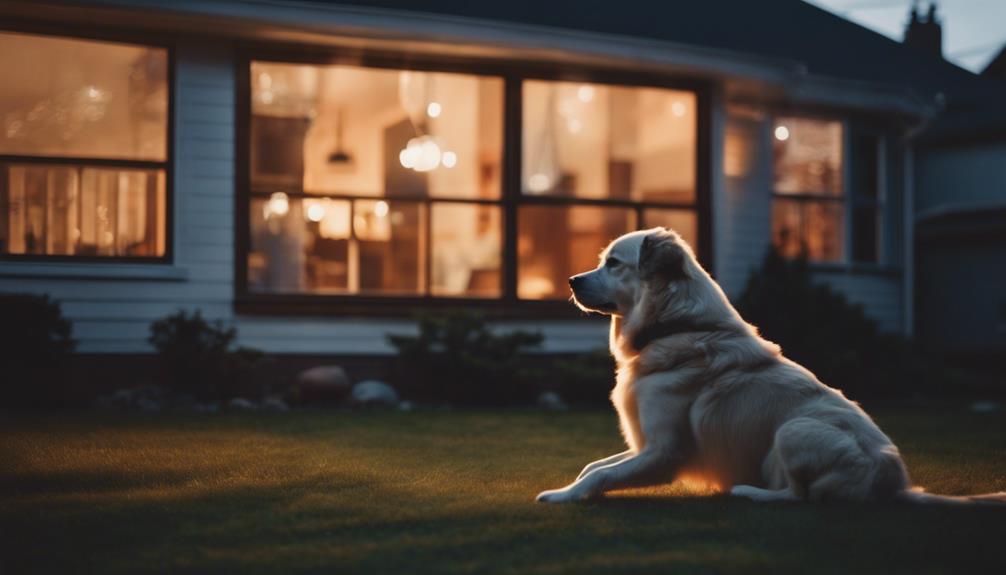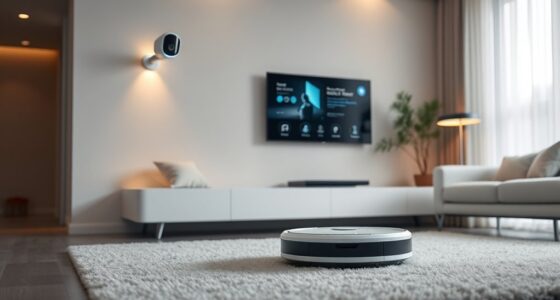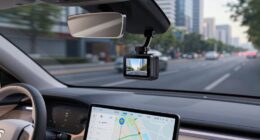Home security systems are essential for safeguarding your home against burglary, fire, and other environmental threats. These systems help deter criminals, with 83% of burglars choosing to avoid homes with visible security measures. A monitored system ensures a prompt emergency response, providing you with peace of mind. Additionally, having a security system in place could lead to a reduction in your homeowners’ insurance premiums ranging from 5% to 20%. You can also take advantage of features such as security cameras, motion sensors, and smart home integration, which enhance overall safety. By investing in a security system, you not only protect your property but also potentially save money in the long run. Explore more about the effectiveness of these systems in securing your home.
Key Takeaways
- Home security systems provide essential protection against burglary, fire, and environmental disasters, enhancing overall safety for residents.
- Monitored systems ensure prompt emergency responses, leading to faster assistance during crises.
- Insurance premiums can be reduced by 5% to 20% with a security system, offsetting monitoring costs.
- Visible security measures deter 83% of burglars, making homes less attractive targets.
Importance of Home Security Systems
Home security systems are essential for protecting your home from threats like burglary, fire, and environmental disasters. These systems help you create a safe environment for your family by incorporating thorough security features, such as smoke detectors and carbon monoxide alerts.
Additionally, staying informed about recent security trends can enhance your understanding of the importance of these systems. With monitored security, you can rest easy knowing that emergency services will be alerted promptly in case of a crisis.
Investing in a smart home security system not only enhances your protection but also offers peace of mind. You can monitor your property remotely through smartphone apps, keeping you connected to your home even when you're away. This level of effective security can deter potential burglars, as visible security measures greatly reduce the likelihood of break-ins.
Moreover, many insurance companies recognize the value of home security systems, often providing discounts on homeowners insurance ranging from 5% to 20%. This financial incentive makes investing in a security system even more appealing. By prioritizing your home's safety, you're not just protecting your belongings; you're also securing a safer future for your loved ones.
Key Benefits of Security Systems

Investing in a security system not only protects your property but also brings a host of key benefits that enhance your overall safety and peace of mind.
These systems offer features that can greatly improve your quality of life, making your home a safer place for you and your family. Additionally, understanding the importance of key factors in choosing a home cleaning service can help you create an extensive safety and maintenance plan for your home.
Here are some key benefits of security systems:
- Crimes deterrence: Studies show that 83% of burglars are deterred by visible security measures, reducing the risk of break-ins.
- Enhanced family safety: Security systems integrate smoke, fire, and carbon monoxide detection, ensuring timely alerts to emergencies and keeping your loved ones safe.
Additionally, having a security system can reduce your home insurance premiums by up to 20%, offering long-term savings.
You'll also find that security features increase your property value, as 72% of homebuyers prioritize these systems in their purchasing decisions.
With professional monitoring, you're not just investing in security; you're investing in your family's safety and well-being.
Components of a Security System

When setting up your security system, you'll want to take into account the essential equipment like cameras, motion sensors, and alarms.
These components work together to create an all-encompassing defense, much like how a heat pump's key components function to regulate temperature and enhance efficiency.
Customizing your system based on your specific needs guarantees every entry point is protected.
Let's explore how these components work together to enhance your home's safety.
Essential Security Equipment
Effective home security relies on essential components like security cameras, control panels, and motion sensors to safeguard your property. These elements work together to create a thorough system that monitors your home and alerts you to potential threats.
Integrating modern technology with traditional security measures can enhance your protection, much like how certain astrological signs may enhance overall allure through their unique characteristics, as explored in astrology and attractiveness.
Here's a quick rundown of key components you should consider:
- Security Cameras: Capture real-time footage and provide visual evidence of any suspicious activity.
- Motion Sensors: Detect movement and trigger alarms or notifications, adding an extra layer of protection.
In addition to these, alarm systems and smoke detectors play critical roles in keeping your home safe.
Wireless security options offer the convenience of remote management, allowing you to monitor your property from anywhere.
Control panels serve as the central hub, enabling you to manage your system easily.
System Customization Options
Customizing your home security system allows you to choose the components that best fit your unique needs and lifestyle. When you have a security system installed, you can select from various options, including security cameras, motion sensors, alarms, and control panels. This system customization guarantees that you prioritize essential features tailored to your security needs. Additionally, modern technology has enhanced home security with options like garage door openers that offer remote access and increased safety.
For added protection, consider incorporating video surveillance and advanced options like infrared cameras and smoke detectors. You can also integrate smart locks and home automation systems, making it easier to manage your security settings. With wireless systems, remote monitoring becomes a breeze, allowing you to keep an eye on your home from anywhere using your smartphone.
If you want peace of mind, professional monitoring services can be included in your setup. This means trained professionals provide 24/7 oversight and can send immediate emergency alerts if needed. By customizing your home security system, you create an effective solution that not only enhances your safety but also aligns with your budget and lifestyle preferences. In the end, you get a tailored security system that truly works for you.
Types of Home Security Systems

Home security systems come in various types, each offering unique features to meet your specific safety needs. You can choose between wired and wireless home security systems, with the latter providing the convenience of remote monitoring via the internet. Additionally, evaluate how integrating your home theater setup with security features can optimize both entertainment and safety in your living space, such as using essential components like security cameras alongside your projector system.
Here are three key types of home security systems to evaluate:
- Professionally Monitored Systems: These connect to alarm companies that alert emergency responders during incidents, ensuring rapid response when you need it most.
- Self-Monitored Systems: With these, you're responsible for responding to alerts, giving you full control but requiring more attentiveness.
Customization of home security systems is essential for complete security. You can tailor your setup with components like security cameras and motion sensors to address your specific concerns. Whether you prefer a basic setup or advanced features like infrared cameras, the right system can provide the protection you need for peace of mind.
Cost Considerations for Homeowners

When weighing the cost of a home security system, you should consider not only the initial equipment and installation expenses but also the ongoing monitoring fees and potential insurance savings. The initial investment in a security system can be around $400, but the financial advantage comes from the long-term savings and reduced risks.
Here's a breakdown of cost considerations for homeowners:
| Cost Element | Estimated Amount |
|---|---|
| Initial Equipment Cost | $400 |
| Monthly Monitoring Fees | $9 – $60 |
| Insurance Premium Savings | 5% – 20% |
| Average Loss from Burglary | $2,661 |
Enhanced Functionality and Features

Enhancing your security system with modern features can greatly improve your peace of mind and control over your home. Today's smart home security solutions offer advanced functionalities that keep you informed and connected. With the rise of AI advancements in technology, these systems are becoming increasingly sophisticated, allowing for better threat detection and response capabilities.
With remote access via smartphone apps, you can monitor live camera feeds and receive real-time alerts from anywhere. This integration allows you to stay in touch with your home's security, even while you're away. Key features include:
- Video Recording: Capture vital footage that can serve as evidence for any incidents.
- Automated Alerts: Get instant notifications about unusual activity, guaranteeing you're always in the loop.
Additionally, integrating your security system with other smart home devices helps you manage lighting and thermostats, enhancing both security and energy efficiency.
Security System Placement Strategies

Strategically placing your security system components can substantially boost your home's protection against potential threats. To maximize effectiveness, focus on securing all entry and exit points, including doors, windows, and garages. Security experts suggest prioritizing high-risk areas, like back doors and ground-floor windows, for sensor and motion placement.
Here's a quick reference table for ideal placement strategies:
| Component | Recommended Height | Key Focus Areas |
|---|---|---|
| Security Cameras | Eye level | Clear line of sight |
| Motion Sensors | 6-8 feet | High-risk areas |
| Door/Window Sensors | Lower (near ground) | All entry and exit points |
Installing security cameras at eye level enhances identification accuracy during incidents. Verify that cameras have a clear line of sight and avoid obstructions like trees or furniture. Properly placed sensors help reduce false alarms caused by small animals, allowing your home security system to function effectively. By implementing these placement strategies, you'll create a robust defense against potential intruders.
Insurance Benefits and Savings

Investing in a home security system can really pay off by revealing significant savings on your insurance premiums. Many insurance companies offer discounts, recognizing that a professionally monitored security system reduces the risk of theft and damage. This proactive approach can lead to insurance premium reductions of up to 20%, translating into real financial savings for you.
Additionally, having a reliable security system can improve your overall customer relationship with your insurance provider, as they may appreciate your proactive measures in risk management email marketing essential.
Consider these benefits of having a home security system:
- Lower Monthly Fee: The savings on your insurance might offset the monthly monitoring costs.
- Evidence for Claims: Video footage from your security system can support your claims in case of theft or property damage.
Additional Safety Measures

When it comes to keeping your home safe, additional safety measures can make a real difference.
By enhancing emergency response and minimizing risks, you not only protect your property but also guarantee your family's well-being.
Let's explore how simple upgrades can considerably boost your home's security.
Enhanced Emergency Response
How can enhanced emergency response features in home security systems provide peace of mind during critical situations? With monitored systems in place, you're not just securing your property; you're ensuring a swift and effective response to emergencies. These systems automatically alert emergency services during incidents like fires or break-ins, greatly improving safety during emergencies.
Here are a few key benefits of enhanced emergency response:
- Immediate Notifications: You'll receive real-time alerts about any potential threats, allowing you to take action or evacuate.
- Professional Monitoring: Even if you can't reach out for help, monitored systems can contact first responders on your behalf in emergencies like smoke alarms.
Comprehensive Risk Mitigation
Thorough home security systems not only deter crime but also integrate additional safety measures that protect against various threats like fire, carbon monoxide, and water damage. A complete home security system includes essential components such as smoke and carbon monoxide detectors, ensuring that you receive timely alerts in case of fire or gas leaks. This proactive approach greatly enhances your family's safety and can prevent catastrophic damage.
Moreover, studies show that having a security system can reduce the chances of burglary by up to 83%, showcasing its effectiveness as a visible deterrent. With professional monitoring services, emergency responders can be alerted immediately when a threat is detected, ensuring rapid assistance during critical situations.
Additionally, remote monitoring allows you to keep an eye on your property even when you're away, providing you with peace of mind. Knowing that your home is safeguarded against various dangers—whether it's a break-in or a fire—helps you feel secure in your living environment.
Ultimately, investing in a complete home security system means protecting your loved ones from a wide range of risks, making it an essential part of modern home safety.
Frequently Asked Questions
Why Should You Have a Home Security System?
You should have a home security system because it protects your property, deters burglars, and offers peace of mind. Plus, with remote monitoring, you can keep an eye on things, even when you're away.
What Are the Benefits of a Home Alarm System?
Imagine receiving an alert on your phone while at work, notifying you of smoke in your home. With a home alarm system, you get immediate protection, peace of mind, and even lower insurance rates.
Why Is Safety and Security Important in the Home?
Safety and security in your home protect your loved ones and belongings. When you feel secure, you can relax and enjoy life, knowing you've taken steps to prevent potential threats and guarantee a peaceful environment.
What Is the Objective of Home Security System?
The objective of a home security system is to safeguard your property and loved ones from threats. It deters burglars, monitors emergencies, and provides peace of mind, ensuring you feel safe at home.
What Makes Home Security Systems Effective in Ensuring Safety?
Home security systems effectiveness lies in their ability to deter potential intruders and provide timely alerts. The combination of sensors, alarms, and surveillance cameras creates a secure environment, while smart features allow for remote monitoring and control. This comprehensive approach ensures safety and peace of mind for homeowners.
Conclusion
In a world where safety matters, investing in a home security system isn't just smart—it's essential.
It protects your loved ones, deters potential threats, and offers peace of mind.
With advanced features, strategic placements, and insurance benefits, you're not just securing your home; you're securing your future.
Don't wait for an incident to happen. Act now, safeguard your space, and embrace the confidence that comes from knowing you've taken steps to protect what truly matters.









